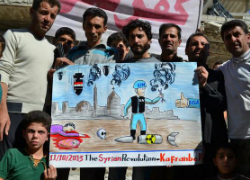On October 11, the Norwegian Nobel Committee announced that the 2013 Nobel Peace Prize would be awarded to the Organization for the Prohibition of Chemical Weapons, a little-known watchdog organization based in The Hague, which has just begun work on dismantling Syria’s chemical weapons stockpile. The announcement was greeted with surprise and some disappointment; the Prize had been widely expected to go to Malala Yousafzai, the 16-year-old Pakistani education activist who famously survived a Taliban assassination attempt. But the selection of OPCW is more concerning for other reasons – namely, it is effectively an endorsement of the international community’s gross inaction in response to Syria’s ongoing war, and follows a series of controversial decisions by the committee entrusted with what is supposed to be one of the world’s most prestigious awards.

For all of its connotation as an august institution of elder statesmanship, the Peace Prize is not awarded by experts or experienced peacemakers but by politicians. The Norwegian Nobel Committee is a five-member body elected by the Norwegian Parliament, and its makeup usually reflects the political makeup of the Parliament. And in recent years, the Committee seems to be employing bizarre political judgments in its choice of prize recipients.
The 2009 award to President Barack Obama, less than a year after he took office, seemed oddly premature. Even Obama himself appeared perplexed by it. The 2012 choice of the European Union, in the midst of its profound mismanagement of the ongoing economic crises, came off to most observers as a bad joke. But the choice of OPCW risks not merely tarnishing the Prize’s prestige, but undermining the very causes of peace and human dignity it is meant to stand for.
OPCW was created in 1997 to oversee the implementation of the Chemical Weapons Convention, which prohibits the use of chemical weapons and requires the dismantling of all stockpiles. The Nobel Committee cited the group’s “long-standing efforts to eliminate chemical weapons” worldwide, which have succeeded in dismantling 80% of declared stockpiles. This record might, in an ordinary year, put OPCW in worthy contention for the Peace Prize, which has often been awarded to disarmament organizations in the past. But the timing, in conjunction with the group’s work in Syria, was unmistakable. And the message it sends has tellingly provoked outrage among Syrians opposed to the murderous Assad regime.
The chances for success of OPCW’s mission in Syria are limited. And whatever its outcome, that mission is most certainly not bringing peace to Syria. The Russian-sponsored deal for Syria to dismantle its chemical arsenal contributes nothing to getting the Assad regime out of power or reaching any kind of settlement to end the conflict, nor was it meant to. It was fundamentally an effort by Assad’s Russian accomplices to lift the threat of American military action against the regime after it killed over 1,000 in August’s sarin gas attack in Damascus. And it succeeded in doing so, leaving Assad free to continue massacring Syrians with conventional weapons without fear of consequences. This is the deal that the Nobel Committee has now effectively granted its seal of approval. What kind of peace does the Committee think it is promoting? As usual, the Syrian town of Kafranbel, known for its poignant revolutionary artwork, makes the point clearest.
Scott Petiya is a 3LE law student at the University of Denver Sturm College of Law and a staff editor for the Denver Journal of International Law & Policy.

